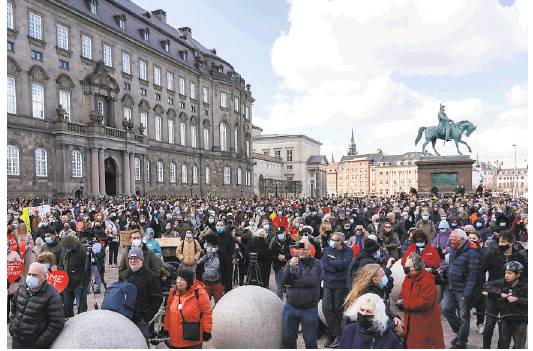DENMARK
Syrian refugees fear for future without asylum
By David Keyton
COPENHAGEN — An email brought Faeza Satouf’s world to a standstill.
The 25-year-old Syrian refugee had fled the civil war with her family in an all-too-familiar journey across the sea to Europe, where they finally arrived in Denmark and were granted asylum in 2015. Yet six years later, she was being told she had to go back — alone, and soon.
Ten years after the start of the uprising against Bashar al-Assad’s regime, Denmark has become the first European country to start revoking the residency permits of some Syrian refugees, arguing that the Syrian capital, Damascus, and neighboring regions are safe. Few experts agree with Denmark’s assessment.
“There are no laws in Syria that can protect me like here in Denmark,” Satouf said with palpable anxiety. “My father is sought after in Syria, so of course I will be arrested upon my return.”
In the past six years, Satouf has learned Danish, graduated from high school with flying colors and is now studying to be a nurse while working in a supermarket. She can’t understand why a country that encouraged integration and which needs nurses amid a pandemic would expel her and others, mainly women.
For now, the decision affects only people from certain areas of Syria who obtained their initial asylum because they were fleeing civil war. It doesn’t include those who can prove a specific threat to their lives, such as men who could face conscription into Assad’s army.
Because Denmark has no diplomatic relations with Syria, those who refuse to leave the country cannot be sent to Syria. Instead, they are sent to deportation centers, separated from family, unable to work and withdrawn from education programs.
Single women are likely to be sent to the Kaershovedgaard deportation center, a remote complex of buildings about 185 miles west of Copenhagen.
“It is like a prison, but they are allowed to go out in the daytime,” said Gerda Abildgaard, who has visited the center for several years for the Red Cross.
The Danish government argues that it made clear to the Syrians from the beginning that they were being offered only temporary protection.
Denmark’s approach marks a dramatic transformation of a nation that was the first to sign the 1951 U.N. Refugee Convention, and which was long seen as a paragon of openness and tolerance.
David Keyton is an Associated Press writer.
